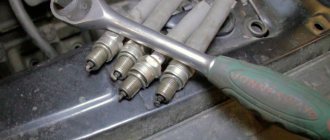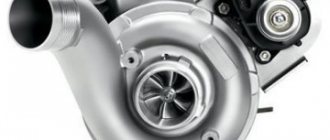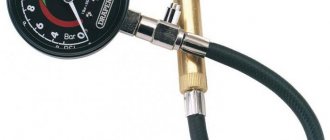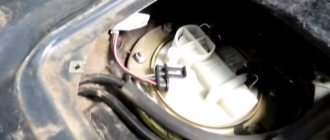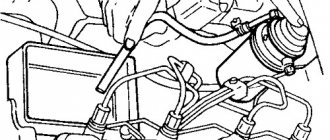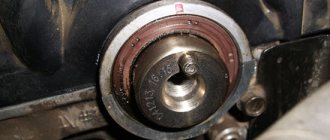Engine knocking is a common problem for cars that have been used without proper care for more than 10 years. They are often accompanied by other engine noise and vibration. This is also true for cars with a mileage of more than 100 thousand km. Gasoline or diesel engine – it doesn’t matter. If you do not undergo diagnostics at least once a year, then you are likely to encounter these problems in a new car or motorcycle. Since the engine consists of many complex components, various factors can be the possible cause of such problems. Each of these problems signals a specific threat and requires its own method of elimination.
Two main causes of knocking
Knowing why the engine knocks, you can then act in accordance with the cause. According to experts, knocking in the engine when starting occurs only for 2 general reasons.
- This is either worn out elements inside the power unit;
- Or, if the engine starts knocking, detonation has occurred.
Detonation
Let's start with detonation, as it can create irreparable problems. Detonation is already an alarming signal to the driver, who must know what it is and what are the reasons for this phenomenon when starting or operating the engine.
Detonation occurs due to improper distribution of the air/fuel mixture inside the cylinders. This, in turn, results in uneven combustion. Fuel, gasoline or diesel fuel, burns in the cylinders of car power units, if normal conditions are provided, during the process of mixing with air. All motorists, even beginners, should know this.
When detonation occurs, an explosion occurs inside the cylinders, the mixture burns unevenly, which can lead to damage to the walls or the piston itself.
This phenomenon has been known for a long time, since the creation of internal combustion engines. Described in almost all sources as automatic gas ignition. Previously, it was not possible to thoroughly test this phenomenon. For this very reason, in those days it was thought that detonation was related to ignition, but this is not so.
The knock sensor was specially invented and is equipped with almost most modern cars. This regulator perceives the mechanical energy of vibrations occurring in the cylinders, and then transmits an electrical impulse to the ECU.
Knock sensor
It is noteworthy that during detonation there is a clear knocking sound, more loud. Any specialist or experienced driver with experience can recognize detonation by ear. The knocking appears in this case due to various additional loads on the machine’s engine.
- This may be a sudden acceleration;
- Slow movement, for example, on inclines;
- Driving in the wrong gear and much more.
So, the reasons why detonation occurs at startup.
- Very high temperature of the cylinders or piston in various areas;
- Too high a compression ratio, which occurs due to an excessive layer of carbon deposits remaining on the piston crown;
- Heavy load on the engine, occurring at low crankshaft speed;
- Poor quality of fuel (gasoline/diesel) filled at Russian gas stations;
- Hot carbon deposits remaining in the combustion chamber;
- Spark plugs, which can also be a cause if they are faulty or do not correspond to the thermal conditions.
Wear of engine components
A knock can occur, as mentioned above, due to wear, for example, of connecting rods or bearings. If such a knock has already appeared, then nothing will help: neither the use of more viscous oil, nor later ignition, nor various linings or “fur coats” that are placed under the liners. Although for a while, it will still help. In particular, a worn-out connecting rod hitting the crankshaft journal will no longer make such a strong knock, but only a muffled, almost imperceptible one.
connecting rod
The connecting rod knock did not spare the diesel engine either. True, the noise picture here may be somewhat different. When the car is moving, the pistons of the diesel unit come close to the cylinder head, which forces them to touch the cylinders. Even after the “knock” cylinder stops working, the rumble remains and continues for some time. It is worth noting that you cannot drive a car, diesel or gasoline, with the engine knocking because of the connecting rod, especially when it’s hot. Other parts of the power unit may also knock. These could be, for example, valves, a fuel pump drive that produces an unpleasant sound when knocking, pulleys, etc. A diesel engine can present another surprise to the car owner. The knock of plunger pairs, with which nothing can be done. Although you can drive with such a knock for quite a long time, because it does not affect anything. According to experts, it may happen that after three years such a knock will still lead to wear of some important components, and the car may consume much more gasoline than necessary.
IMPORTANT! At the same time, the sound can come not only from the engine. Apart from small stones falling into the car, the air conditioner, suspension, etc. can make noise. The problem of noise is relevant for any internal combustion engine, be it 22sdi or 3sz.
Other causes of engine noise
The list of causes of creaking or knocking in engines is extensive - automotive experts name 120-130 malfunctions of varying severity that lead to noise. The most private of them:
- Arbitrary expansion of gaps in valves.
- Crack in the valve spring.
- Broken cams or camshaft valves.
- Broken crankshaft connecting rod bearings.
- Piston failure.
- Low oil pressure (pay attention to the sensor).
- Spontaneous ignition of a flammable mixture (detonation).
- Arbitrary expansion of the gaps between valves and liners.
- The chain hits the damper.
Each problem requires its own solution. It is better to search for such a solution together with the specialists of the service station, but it would not be amiss to at least roughly understand what, where and why the knocking in the engine occurs. At a minimum, this will allow you to plan for repair costs. Some problems can be resolved on your own.
Engine knocking at idle
It is believed that the cause of this noise is a malfunction of the valves. It is not always so. To try to independently determine the source of the noise, you can use a car stethoscope.
Engine knocking at idle is actually more often associated with valves. If the sounds disappear when you gain speed, this is probably the reason. Often the problem does not go away, the sound of faulty valves is simply drowned out by a running engine. There is no point in delaying the adjustment of valves, since their incorrect functioning leads to accelerated wear of parts of the gas distribution system.
The easiest way to adjust valve play is to tighten the rockers or replace the washers. A knock in a VAZ 2109 engine often indicates wear on the cylinder head. This does not affect the driving performance, but it will not solve the issue.
A malfunction in hydraulic compensators is also a common source of knocking. If it does not go away after warming up, the cause is usually the oil. It is necessary to check the lubricant level in the crankcase and, if necessary, add lubricant. If this does not help, you should check or replace the fuel pump. If the problem is not solved, the service life of the cylinder head will be significantly reduced.
A worn piston also makes a loud knocking noise. If using a stethoscope it is determined that the sound is coming from the middle part of the cylinder, it is most likely the piston. If the knocking noise disappears at rpms of 2 thousand and above, then the probability of problems with the piston is 90%. The most reasonable thing is to contact specialists, since a major overhaul of the engine is possible. You can try changing the pistons and crankshaft liners by grinding it.
Other common causes include a faulty connecting rod bushing. Worn camshaft bearings or pumps produce a dull knock.
Knock in engine when starting cold
Among the causes of noise when the engine knocks when cold, experienced auto mechanics identify five main ones.
- Incorrect valve adjustment. It is necessary to inspect the thermal gaps; usually the problem with a high mileage engine is associated with them.
- Wear of hydraulic compensators. It is better to change them, and at the same time change the oil and filter.
- Incorrect main bearing clearance - more than required. In this case, the knocking noise will be heard until the oil pressure reaches a high level. If during warming up and after it the oil pressure level “jumps”, the problem is in the oil pump.
- The timing mechanism often knocks if the gaps in the beds increase too much. This knocking noise goes away after it warms up.
- The most serious problem that a knocking sound indicates when starting from a cold state is wear or defect of the piston, as well as wear of the rings.
Valve knock
The appearance of extraneous sounds usually indicates engine wear, especially if it begins to stall. In this situation, it is necessary to carry out a full diagnosis, repair or replacement of parts.
IMPORTANT! There may be a difference between knocking noises in a cold and warm engine. But often turning the engine on at high speeds simply drowns out the valves and pistons.
Since the motors differ in design, the reasons for the noise are different for each. For example, in a Priora sedan the tension roller of the alternator belt may be knocking.
Valve knocking on a cold engine
A common cause is incorrect clearances between the arms and camshaft cams. Due to too much distance, the cam hits the rocker, producing a loud metallic knock. The larger the gap, the louder the sound.
Another common problem is that the valve clearance is too narrow. Over time, the clamped valves stop closing correctly, the engine will begin to overheat, and compression will drop. In addition to the obvious problems, this leads to excessive fuel consumption. You can avoid the problem by adjusting the valves after 10-15 thousand kilometers.
The third main reason is detonation (on an automatic transmission this can be seen by random gear shifting). As a result of micro-explosions, the valves begin to knock. But the problem is not with them. The main signs of detonation are changes in smoke from the exhaust pipe, vibration and a decrease in engine power.
Drivers also experience a knocking noise in a cold engine when the pusher wears out.
Valve knocking on a hot engine
On a hot engine, valves may knock due to low oil pressure. First you need to make sure that the condition (contamination) of the oil is normal, and its technical characteristics (viscosity, etc.) correspond to the engine. If after replacement the pressure measurement does not show an improvement, the matter is due to wear or defects in parts.
Connecting rod knock
The knock of a connecting rod is the most dangerous signal of all extraneous noise. He says the motor will break down any moment. To the ear it sounds like a metallic, slightly muffled knock. But acoustic diagnostics are difficult due to differences in engine designs. One of the simple ways to determine that a connecting rod is knocking is to turn off the spark plug in the cylinder that is suspected.
Injector knock
In a diesel engine, knocking often comes from the injectors. This usually happens due to increased fuel supply. This is caused by misadjustment of the fuel equipment. To the ear, this is a characteristic clicking sound, sometimes reminiscent of a chirping sound. The sound is coming from the top of the engine. If you hold the injector fuel line, you will feel vibration.
Knocking fingers
Piston pins can knock for two main reasons: a malfunction or detonation (the problem is related to inappropriate fuel).
What if you hear a knock and then it goes away?
A common cause of knocking noises heard when the engine is cold and disappears when the engine is warm is wear of the cylinder liners, that is, an expansion of the gap between the piston and the cylinder wall. When warmed up, the pistons expand, the gap decreases, and the knocking noise disappears.
If an extraneous knocking noise begins when the speed is increased, this indicates extreme wear of the crankshaft (a knock is heard in the cabin on the left side) or parts of the CPG. When the engine is cold, the oil is more viscous and fills the spaces in the gaps. While the engine is running, it liquefies, resulting in a knocking sound. It disappears when the engine cools. Also, a common cause of noise can be a damaged pin or a crack in the piston skirt.
Metallic knock
This type of sound indicates that metal parts are knocking against each other. If the sound resembles a metallic ringing, detonation is occurring in the engine. It is often accompanied by thick black smoke coming out of the muffler. A weakened chain may sound - such a knock is clearly audible and resembles a click. It goes away or gets quieter when you give it gas. A metallic knock accompanied by a quiet rumble is often produced by the gearbox . If you squeeze the clutch while the engine is running and the knocking goes away, that’s the problem.
A loud knock
A rhythmic, ringing knock indicates the need to replace the connecting rod bearings. If it goes away when the ignition is turned off, the probability of this option is 90%. But these sounds can appear for many reasons: from low-quality oil or oil clogged with impurities to a poor-quality crankshaft. A worn valve rocker makes a loud knocking sound (more like clicking).
A loud metallic knock indicates that there is no oil lubrication between the contacting parts.
Thud
A dull, low knocking sound at the bottom of the crankcase indicates the need to replace the main bearings. If it increases significantly with increased crankshaft rotation, the problem is 90% related to them. Another sign of such wear is a drop in oil pressure. The crankshaft itself (its main journals) can make similar sounds - when the engine is running warm, they can be heard in the cabin on the left.
The dull nature of the knocking sound indicates that parts are hitting, one of which is made of soft metal, and there is a layer of lubricant between them.
Engine knocking when you press the gas
A knock in the engine when changing the number of revolutions (pressing or releasing the accelerator pedal) occurs for a number of reasons. It can be a dull or ringing knock, single or rhythmic. What all options have in common is that there is no noise at high speeds, only when the car needs to start or pick up speed. A knocking sound in the engine when revving up can also occur due to wear on the engine mount. But in 90% of cases, if the sound occurs only when the driver begins to press the gas, disappearing later (and does not affect the engine power), the reason is poor gasoline and detonation.
Diesel engine camshaft knocking
The diesel camshaft has a muffled knock, which varies at the initial stage when starting a cold engine. The rhythmicity of the camshaft knock is exactly two times less in frequency compared to the same frequency of crankshaft knocks. The moment the engine oil reaches the bearings, the knocking noise disappears. This usually takes about 3 seconds.
The reason for this camshaft knocking noise is its worn bearings. The causes of wear are similar in nature to the factors that lead to knocking of the crankshaft of a diesel engine: lack of lubrication, dirty engine oil, insufficient pressure in the lubrication system, scratches on the camshaft. As wear increases, the camshaft will also knock on a warm diesel engine.
It is possible to operate an engine with such a malfunction for a certain time, but only if the timing belt is structurally free of hydraulic compensators. The presence of expansion joints will lead to accelerated wear and further damage as a result of driving with camshaft knocking.
The point is that the knocking camshaft will move a little. Shifting the shaft up and down will lead to the formation of wear in the area of operation of the hydraulic compensator and the parts associated with it, and the clearances will be disrupted. The result will be that the hydraulic compensator will open the valve slightly without the proper clearance.
The result will be a drop in compression, difficulties will arise with starting the internal combustion engine, the diesel engine will lose power, and diesel fuel consumption will increase. Low compression will lower the temperature in the cylinders, the engine will operate unstably, which will cause active carbon formation and local overheating, and can also lead to burnout of the piston and valves.
Engine knock in VAZ 2114
Car owners, especially those who do not have much experience, often complain about the knocking of a cold engine in a VAZ 2114. This includes new cars that have not driven even 50 thousand km. There is no need to be afraid of this; it is related to the technical features of the model. The design of the piston clearances was designed many years ago (then the task was to maximize the piston stroke) and remained practically unchanged. The high noise level is due to the height of the knee. If your car is under warranty, you can contact an official AvtoVAZ representative.
At idle
Usually, when idling at low speeds, you can hear light knocking sounds from the valves. On eight valve engines it is more pronounced than on sixteen valve engines, despite their twice the number. This is explained by two reasons: firstly, thermal clearances are regulated by hydraulic compensators, and secondly, with an increase in the number of valves, the number of amplitude oscillations also increases and together the sound waves mix to form a noise effect, rather than individual sounds.
On many eight-valve engines, the thermal clearance is adjusted manually. And if the thermal gap is set above the limit set by the manufacturer, the valve mechanism will begin to knock while the engine is running, the sound will be especially pronounced on a cold engine in the upper part. A large gap will also affect the change in the injection phase of the fuel mixture, since the gas distribution mechanism of the internal combustion engine will begin to work with some delay, both in opening and closing the valves.
If the engine is idling without audible light knocking noises, one can make an unmistakable conclusion about greatly reduced thermal clearances of the valves. With such gaps, the dynamic compression of the engine decreases, leaks occur in the seat-valve pair, and burnout of the edges of the valve plates is possible. At the same time, the dynamic performance of the engine decreases and fuel consumption increases.
It should be noted that most often pronounced noises are heard at low crankshaft speeds, i.e. at idle speed. The knocking of connecting rods is also clearly pronounced in the lower part of the cylinder block, even if you do not use a stethoscope. Connecting rod knocking may occur due to wear of the bearings and this may be accompanied by a flashing oil pressure warning light. Excessively loud noise from connecting rods is dangerous because if, for example, after repair the connecting rod cover bolts are not tightened to the specified standard, it can become detached and the connecting rod, bouncing off the crankshaft journal, can knock on the block wall and ultimately break through it. People call such a technical accident “the connecting rod showed its fist.”
At the injectors, in idle mode, sounds are heard from the operation of the valve mechanism, in the form of a needle rod, locking and opening the path for fuel injection. The knocking noises of the injectors are peculiar and, depending on the frequency of operation of the needle, resemble more of a crackling sound. At high crankshaft speeds, the pulse repetition rate increases and the sound is practically no longer audible against the general background.
Knock on Lada Vesta
A common cause of knocking in the Lada Vesta on the right front part of the car is a design feature of the right engine mount. This does not affect driving performance; you can get rid of extraneous sound by lubricating the engine mount with silicone grease (except WD-40). It is applied there, the metal comes into contact with the rubber. You can install plates 1-2 mm thick into the support.
Knock of the pillow The pillow (support) of the engine is the part that fixes it. It prevents movement and dampens vibrations from the motor. The number of such supports varies depending on the model. In Russian cars, problems with such gaskets are quite common. This does not affect driving performance, but is annoying for the driver. For a number of reasons, this is relevant for Lada Vesta.
The main signs of support malfunctions:
- Increased vibration of the steering wheel when the engine is running.
- Knock in the gearbox area when driving on poor quality roads.
- Excessive jerking in the transmission when driving or changing gears at high speed.
- Knocking noise under the hood when driving on poor roads and idling.
To determine if the airbag is knocking, just drive off with the hood open. If the engine moves and a characteristic sound is heard, similar to the knocking of a faulty shock absorber, the cushion must be changed. With the engine turned off, you can try to move it by inserting a pry bar between the engine and the body.
The condition of the lower cushions must be determined by driving the car into an inspection pit.
Self-diagnosis of disorders
If it is not possible to carry out professional diagnostics in a car service center, then you can try to independently identify the reasons why the characteristic metallic sound appeared.
- Initially, you should clearly make sure that the sound comes from the motor and not from other units or components. If your vehicle has a manual transmission, it is recommended to fully depress the clutch so that the clutch disengages from the engine. In this case, it will be possible to clearly determine that the cause of the knocking is located precisely in the power unit, and not in the transmission.
- Then you need to carefully listen to the knocking, determine its duration, cyclicity, and sound intensity. As noted earlier, even a certain level of tone is characteristic of different faults.
- a loud knock that gains speed and comes from the upper area of the cylinder head - a problem with valve clearances;
- a sound similar to the impact of a small metal ball on the lid with a characteristic increase - a malfunction of the hydraulic compensator;
- rustling, whistling and creaking sound - a malfunction of the timing chain or belt, as well as the alternator belt;
- detonation has a ringing, bright sound color, the term “fingers knocking” is usually used;
- It is also imperative to check the reliability of fastening of the engine mounts (mounts) and, if possible, the entire chassis
To listen more carefully to the knocking noises that arise, car owners very often use a device such as a technical-type phonendoscope. Professional diagnostics involve the use of a motor tester.
There are many reasons for the appearance of extraneous noise in the engine, including knocks of various types. Many of them indicate minor problems with which the car can peacefully “coexist” for a long time. But also a knocking noise that appears may indicate serious damage to parts and/or components of the internal combustion engine, which is strictly forbidden to ignore.
The design of the engine involves the interaction of many parts and assemblies, which are subject to quite significant loads during operation. A marker for many internal combustion engine malfunctions is an outgoing knock, which has its own individual tonality, duration and intensity for each type of breakdown.
Thanks to this, with careful diagnostics, it is possible not only to identify the cause of the internal combustion engine malfunction, but also to eliminate it in a timely manner.
Engine knocking in Kia Sportage 3
Like the IX35, the Sportage 3 has a G4KD engine. In addition to the problems described above, this engine has increased demands on oil. Due to savings on materials, which the manufacturer is famous for (in this engine, the plant saved on cooling nozzles), the pistons experience excessive temperature load. To delay the appearance of noise as much as possible, you need to change the oil more often, fill only certified oil (possibly with additives). It is possible to get rid of knocking completely only through a major overhaul.

